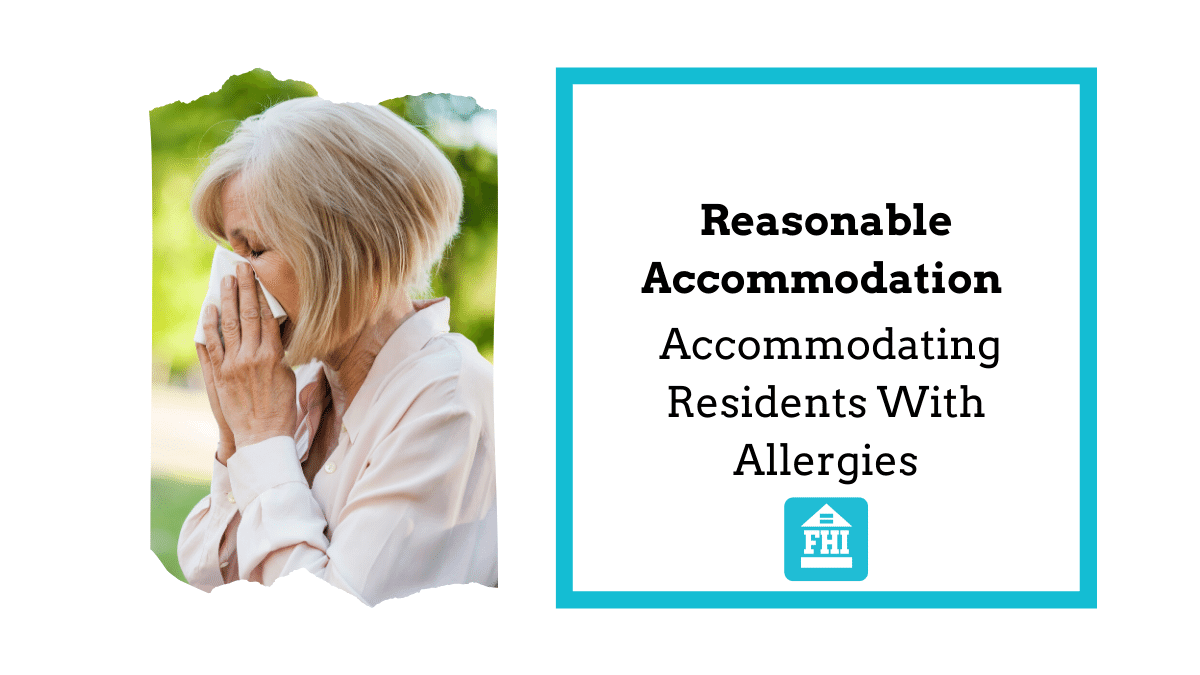
Reasonable Accommodation Definition
A reasonable accommodation by definition is an adjustment made in a system to accommodate or make fair the same system for an individual based on a proven need. It is one of the many staples within Fair Housing that we all need to be educated about.
Table of contents
Reasonable Accommodation – Resident Allergies
The focus of this article will be on working with a resident who notifies the management of allergies that they deal with. It can be difficult for management to provide reasonable accommodations to residents with allergies. What can you do? What are some best practices?
As many of you have experienced, it appears that the occurrences of residents with severe allergies, asthma, and multiple chemical sensitivity are increasing. These types of situations can create difficult problems for a housing provider attempting to meet the needs of the residents.
If you liked this article be sure to check out our related article entitled: Educate Maintenance Staff About Reasonable Modification Requests
They want to provide reasonable accommodations, while also not limiting the use of chemicals and products by other residents and staff, particularly those that are critical to building maintenance.
As an example, let’s review the situation of Mike Jones, a resident of Happy Village. Mike has allergies to fresh paint and he has requested that no new paint be applied anywhere inside his building. The first issue to address is whether Mike is disabled, and, therefore entitled to a reasonable accommodation.
Is The Allergy A Disability Or Not?
The Fair Housing Act defines a disability as a mental or physical impairment that substantially limits one or more major life activities. If Mike’s symptoms are minimal, arguably he’s not substantially limited by his allergies, and thus not disabled.
For most of us with allergies, while the reactions may be uncomfortable, it is probably reasonable to state that those reactions do not “substantially limit one or more major life activity” thereby rising to the level of a disability.
In the request form and verification form its ok to point out the subtle but important difference between an “impairment” and a disability. It’s also ok to ask Mike and his verifier whether Mike has been tested to determine what he’s allergic to, and whether there may be other substances involved in his allergy attacks, i.e., smoking, animals, and household chemical products.
If the allergy is not a disability, then management is not legally required to accommodate Mike. On the other hand, if paint fumes cause Mike’s throat to close and hives to break out on his body, these symptoms would probably be considered a fairly substantial limitation to his major life activities.
In this case, only a third party verifier can determine whether Mike is disabled, and, if so, what accommodations his disability requires to enable him to live in his apartment. In this situation, it’s a good idea to ask the verifier what other alternatives the verifier can propose to alleviate Mike’s reaction.
For purposes of our example, let’s say that Mike has provided verification from his doctor that his allergy is a disability. It states that he needs to be far away whenever paint is applied and for at least 48 hours afterwards. In this example, a reasonable accommodation would be to resist painting within Mike’s apartment while he lived there. The housing provider could also agree to provide him advance notice whenever anyone is planning to paint anywhere within his building.
Reasonable Accommodation Option
Another reasonable accommodation would be to discuss with Mike whether it would be helpful to perform all painting within the same time period. Mike could then choose to remove himself from the building for 48 hours after the inception of the painting. It is not a housing provider’s responsibility to pay for alternative housing arrangements if Mike decides to leave the building for a few days whenever painting is planned. Another discussion topic with Mike is whether a different type of paint would significantly decrease his reaction. If so, and if the price of the different paint is not exorbitant, a change to that type of paint would be a reasonable accommodation.
It’s important to note that these discussions with Mike to obtain a better understanding of the problem and discuss possible resolutions are required. HUD and the courts now view the “interactive process” as an essential step by housing providers during the reasonable accommodation process if the housing provider plans to deny or offer the resident an alternative accommodation.
Reasonable Accommodation Or Unreasonable?
We recently learned of a resident who requested that none of the other residents within his building use any type of chemicals within their own apartments without providing the resident with one hour prior notice. For persons with multiple chemical sensitivity this may be a preferable situation, but it is highly unlikely that this request would ever be deemed to be reasonable in multifamily housing.
While a housing provider would be justified in refusing to require such notice by other residents, it would be a reasonable accommodation to send a letter to the other residents requesting that no chemicals be used outside the apartments or in the common areas. It would also be a reasonable accommodation to provide this resident with advance notice if the housing provider will be using any chemicals in and directly outside the building.
As with Mike’s situation, this type of request requires a housing provider to conduct an interactive process by having one or more conversations with the resident so that the housing provider is able to offer the most effective alternative accommodation.
As you can see there is no cookie-cutter approach to dealing with what a reasonable accommodation is and is not. It is a broad topic that requires education and training. Reviewing potential scenarios, like the ones discussed, can also provide perspective.
Regular Fair Housing Training a Must
Property management professionals are best served when regularly trained to identify the issues and then discussed as a team. Dealing with reasonable accommodation requests can be quite dynamic. Working together as a team with an understanding of your company’s policies and procedures achieves the best results.
If you are not clear of the legal requirements, reach out to a qualified fair housing attorney when necessary. The more you know the better you will be when dealing with complex reasonable accommodation requests.
Regular Fair Housing training is a must for property management professionals. Contact us for more information about Fair Housing training for your team.
